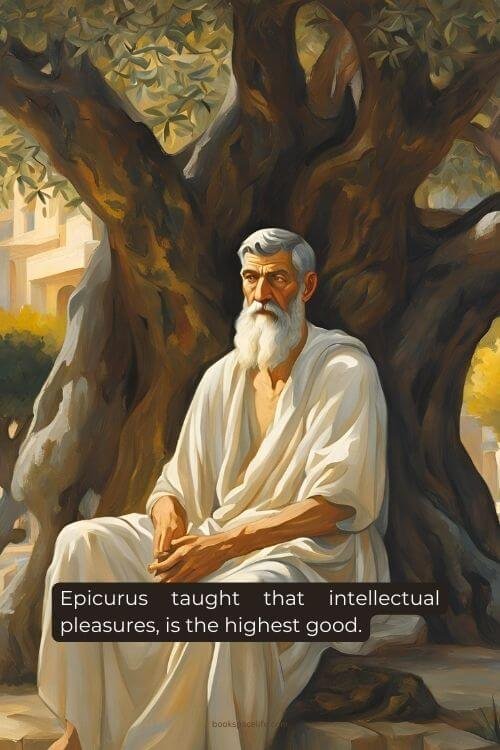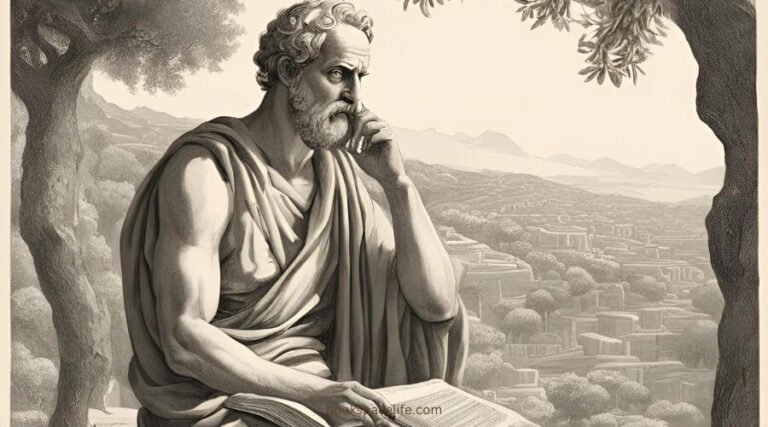Thales of Miletus
Epicurus: The Philosopher of Happiness and Friendship
Epicurus (341–270 BCE) is a towering figure in the history of philosophy, known for his profound insights into the nature of happiness, pleasure, and the good life.
His teachings emphasized the pursuit of tranquility and the importance of friendship, and he laid the groundwork for a school of thought that has influenced countless generations.
This blog post explores Epicurus’ life, including his birth, travels, education, philosophical contributions, and the enduring impact of his ideas on modern thought.
Quick Read
Table of Contents
(1) Early Life and Education
Epicurus was born in Samos, a Greek island in the Aegean Sea, in 341 BCE. His father, Neocles, was a schoolteacher, and his mother, Chaerestrate, provided him with an early education that encouraged curiosity and learning.
At the age of 14, Epicurus began studying philosophy, and he was particularly influenced by the teachings of Democritus, the atomist philosopher, whose materialist worldview shaped Epicurus’ understanding of the universe.
In his early twenties, Epicurus traveled to Athens, where he was exposed to various philosophical schools, including Platonism and Stoicism.
His time in Athens was formative, allowing him to engage with leading philosophers of the day.
After some years, he moved to Mytilene on the island of Lesbos, where he founded his first school. However, his most significant contributions came later when he returned to Athens around 306 BCE.

(2) Founding of the Garden
Upon his return to Athens, Epicurus established a philosophical community known as the Garden, which became one of the most famous schools of philosophy in ancient Greece.
The Garden was unique in its inclusivity; it welcomed people of all backgrounds, including women and slaves, emphasizing the importance of friendship and communal living.
Epicurus taught that the pursuit of happiness and tranquility is the ultimate goal of life.
He believed that by cultivating friendships and living a life of moderation, individuals could achieve a state of ataraxia (peace of mind) and aponia (absence of pain).
The Garden became a space for philosophical discussions and shared meals, reinforcing the bonds of friendship among its members.
(3) Philosophical Contributions
Epicurus’ philosophy is often summarized as hedonism, but it is crucial to understand that his concept of pleasure was nuanced and focused on the pursuit of long-term happiness rather than mere indulgence. Key elements of his philosophy include:
- Pleasure as the Highest Good: Epicurus argued that pleasure is the highest good and the ultimate goal of human life. However, he distinguished between higher pleasures (intellectual and spiritual) and lower pleasures (sensual). He emphasized that the most fulfilling pleasures are those that bring tranquility and fulfillment rather than temporary gratification.
- Ataraxia and Aponia: Central to Epicurean thought is the pursuit of ataraxia, a state of serene calmness, and aponia, the absence of physical pain. Epicurus believed that by managing desires and focusing on simple pleasures, individuals could achieve these states, leading to a fulfilling and happy life.
- Natural and Necessary Desires: Epicurus categorized desires into three types: natural and necessary, natural but unnecessary, and vain. He argued that the key to happiness is to satisfy natural and necessary desires (such as food, shelter, and friendship) while minimizing the pursuit of vain and unnecessary desires (such as wealth and fame). This approach promotes a lifestyle centered on moderation and simplicity.
- The Role of Friendship: Epicurus placed great importance on friendship as a source of happiness. He believed that the bonds of friendship provide emotional support, reduce anxiety, and enhance the enjoyment of life. In the Garden, he fostered an environment where friendships flourished, asserting that true happiness is best achieved in the company of friends.
- The Nature of the Universe: Epicurus adopted an atomistic view of the universe, inspired by Democritus. He posited that everything is made up of tiny, indivisible particles called atoms, moving through the void. This materialist worldview allowed him to reject the notion of divine intervention in human affairs, promoting a naturalistic understanding of the world.
- Death and the Fear of the Unknown: Epicurus famously stated that “death is nothing to us.” He argued that since death marks the end of consciousness, it should not be feared. By understanding the nature of death as a natural process, individuals can liberate themselves from the fear that often hampers their ability to enjoy life.

(4) Influence and Impact
Epicurus’ philosophy had a profound impact on later thought and continues to resonate today. Some key aspects of his influence include:
- Hellenistic Philosophy: Epicurus played a vital role in the development of Hellenistic philosophy, offering a counterpoint to Stoicism and Platonism. His emphasis on pleasure and the good life contrasted sharply with the more austere approaches of his contemporaries, providing a unique perspective that appealed to many.
- The Renaissance: During the Renaissance, there was a revival of interest in Epicurean philosophy, particularly in relation to humanism. Thinkers like Pico della Mirandola and Montaigne drew on Epicurean ideas, emphasizing the importance of human experience and the pursuit of happiness.
- Modern Hedonism: Epicurus’ ideas have influenced various modern hedonistic philosophies that focus on the pursuit of pleasure and happiness. His emphasis on rationality and moderation resonates with contemporary discussions about ethical hedonism, where pleasure is seen as a vital component of a well-lived life.
- Psychology and Well-Being: In recent years, Epicurus’ teachings have found relevance in the fields of psychology and positive psychology. Concepts such as the importance of social connections, mindfulness, and the pursuit of meaningful experiences echo his emphasis on friendship and the cultivation of happiness.
- Ethics and Moral Philosophy: Epicurus’ approach to ethics, focusing on the consequences of actions and their impact on happiness, has influenced consequentialist theories in moral philosophy. His idea that the pursuit of pleasure should be guided by reason continues to be relevant in ethical discussions.
- Cultural Representations: Epicurus’ philosophy has permeated literature, art, and popular culture. His ideas about happiness and the simple pleasures of life resonate in various artistic expressions, and his figure has become a symbol of philosophical inquiry into the nature of well-being.
(5) Conclusion
Epicurus stands as a significant figure in the landscape of philosophy, offering profound insights into the nature of happiness, pleasure, and friendship.
His teachings, rooted in the pursuit of ataraxia and aponia, emphasize the importance of living a life of moderation and cultivating meaningful relationships.
As we reflect on Epicurus’ legacy, we recognize the enduring relevance of his ideas in contemporary discussions about happiness, well-being, and the human experience.
In an increasingly complex and fast-paced world, his emphasis on simplicity, friendship, and the rational pursuit of pleasure challenges us to reconsider our values and priorities.
In a society often preoccupied with material success and external validation, Epicurus invites us to embrace a more profound understanding of happiness—a happiness grounded in genuine connections, thoughtful choices, and the joys of life’s simple pleasures.
His philosophy encourages us to seek fulfillment within ourselves and our relationships, reminding us that true contentment lies in the harmonious balance of our desires, the richness of our friendships, and the pursuit of a life well-lived.
(A) 7 Quick Facts on Epicurus
- Born on Samos – Epicurus was born around 341 BCE on the Greek island of Samos.
- Studied Philosophy in Athens – He moved to Athens to study philosophy, influenced by Democritus and the Cyrenaics.
- Founded the Garden – Epicurus established his school, known as “The Garden,” emphasizing friendship and simple pleasures.
- Advocated for Hedonism – He taught that pleasure, particularly intellectual and moderate pleasures, is the highest good.
- Wrote Extensive Letters – Epicurus wrote numerous letters, including “Letter to Menoeceus,” outlining his ethical views.
- Rejected Fear of Death – He argued that death is not to be feared, as consciousness ceases.
- Influenced Later Thinkers – His philosophy influenced later philosophers, including the Stoics and modern thinkers on ethics and happiness.
(B) 10 Quotes attributed to Epicurus
- Do not spoil what you have by desiring what you have not. Emphasizing the importance of appreciating what you already possess.
- Pleasure is the absence of pain. Defining pleasure as a state of tranquility and the absence of discomfort.
- It is not so much what we have as how we use it, that we have. Highlighting the value of utilizing resources wisely over mere possession.
- He who is not a good servant will not be a good master. Suggesting that humility and service are essential for effective leadership.
- The wise man does not lay up his own treasure. The more he gives to others, the more he has for himself. Advocating generosity as a source of true wealth.
- The greatest fruits of the earth are obtained by those who work hardest. Emphasizing the relationship between effort and reward.
- Death is nothing to us, for when we are, death is not come, and when death is come, we are not. A reflection on the nature of death and its insignificance to the living.
- Friendship improves happiness and abates misery, by the sweet exchange and interchange of pleasures. Highlighting the importance of friendship in enhancing life.
- If you wish to be rich, do not add to your money, but subtract from your desire. Suggesting that contentment comes from reducing desire rather than accumulating wealth.
- The art of living is to know how to enjoy a little and to endure much. Emphasizing balance in experiencing pleasure and enduring hardship.








